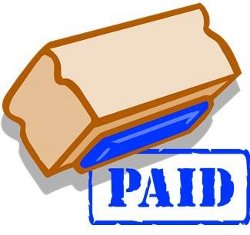
It’s the bane of any business’s existence – trying to extract payment from those who owe you money. Ideally, you’d prefer to devote your time to actually running and developing your business, yet nowadays in these economic challenged times, many businesses seem to spend more and more time on the unpleasant task of debt recovery. There has to be a better way.
An important piece of advice is not to alienate your customer. Yes, they haven’t paid their bill, so you could go all out and threaten to bring in a debt collector or pursue legal action as a matter of principle. However, this approach may not only destroy the business relationship you have with this person, but they may go out of their way to tell everyone about your heavy-handed approach to payments.
Some options to consider for encouraging people to pay their bills are:
- Offer a discount for payments made on time. Some organisations have started doing this, including Australia Post and a few electricity retailers. There’s nothing like a bit of financial incentive to pay bills on time and you’d be surprised how many will make the extra effort just to save a couple of dollars. While you may oppose, in principle, to the concept of paying people to actually do the right thing and pay your invoice on time, think of it another way. What appears to the client as a discount for on-time payment could actually be your standard price, and for those who pay late, they are actually getting charged a penalty for not paying on time which they believe is just the standard price.
- Suspend services when a bill is overdue. If someone is purchasing an on-going service, then this is a persuasive form of encouragement to get people into action. If someone’s website suddenly goes off-line, you’d be surprised how quickly people will leap into action to rectify this, even if they’ve been repeatedly warned that non-payment will result in loss of services in the past. Some people tend to ignore warnings, but a suspension will usually get them to instantly rectify any outstanding payments.
- Request payment up-front. Here at Travel Victoria, we recently implemented a policy that we don’t start work for new clients unless we are paid in advance for our services. We’ve found this very effective as no time or effort is spent trying to recover payment from a client after we’ve finished our work. It also has the added advantage of weeding out those people that are “tyre kickers” and who aren’t fully committed to a business relationship with us. However, one disadvantage is that new clients must trust us to do the work when they pay in advance, which may deter a few people from dealing with us.
- Clearly highlight the terms of their contract and their commitments. It’s unfortunate, but an increasing number of people are simply ordering things or purchasing services with their brain turned off, forgetting who they have signed up with, what they are buying or what the payment arrangements are. Make sure you keep proper records so you can show someone what they have ordered, their acceptance of your conditions, and when payment was due . Most people, when confronted with a simple list of their actions and where they have broken the conditions of sale, will rectify the situation as a matter of pride.
Running a business should be all about serving your customers and growing your business, not the delicate, stressful or unpleasant task of debt recovery. So think about some policies you can implement to ensure that you quickly and easily get paid.
Leave a Reply